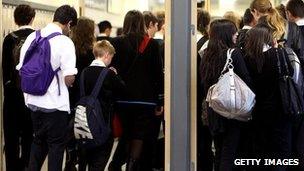Bright pupils from poor backgrounds lag two years behind rich
- Published

The reading skills gap between the brightest rich and the ablest poor is more than two years
Bright 15-year-olds from the poorest homes are lagging more than two years behind their richer peers, a study suggests.
Dr John Jerrim of the Institute of Education analysed reading results of able teenagers in 23 countries.
His findings suggest the gap between bright rich and poor children in England and Scotland is twice that of most other countries.
He called for action to help clever children from poor homes succeed.
Analysis of international reading skills statistics from 2009 showed the gap between the highest scoring rich and poor students was two-and-a-half years in England and two-and-three-quarter years in Scotland.
These gaps are more than twice as wide as in Germany, Finland and Iceland where the richest are ahead by about a year.
Labourers and lawyers
Overall, England and Scotland had bigger skills gaps than 19 and 22 other nations respectively.
The biggest gaps were in New Zealand and the United States.
Dr Jerrim used data from the 2009 Programme for International Student Assessment (PISA) study, which is taken by 15-year-olds in developed countries every three years.
Writing in a special edition of the journal Fiscal Studies, Dr Jerrim said socio-economic inequalities in educational achievement may have declined in England and Scotland over the past decade but they were still higher than in many other countries.
Dr Jerrim said he had essentially been comparing the reading scores of the children of labourers and those of lawyers and doctors and argued that it was vital to narrow the gap.
"Education policy over the last decade has focused considerable attention on improving the attainment of less able children from poor backgrounds with some success.
"Now policy makers must turn their attention to reducing inequalities in educational achievement amongst the brightest children in society, to ensure that those from disadvantaged families are not left behind," Dr Jerrim said.
He added that the findings had important implications for policies to widen access to elite universities and the professions.
And he argued that the current focus on bursaries and internships did not go far enough.
The report suggests that it is important to identify high-potential children from poor backgrounds as early as possible and to ensure they receive sustained support throughout their school careers.
It also notes that schemes to raise academically able pupils' aspirations during secondary school may be the key to raising their later attainment.
A spokeswoman from England's Department for Education commented: "For too long, children from the poorest backgrounds have been left with the worst schools.
"That's why we have introduced the pupil premium to ensure schools are able to offer extra support to the poorest children.
"We are also transforming the worst performing schools, including primaries for the first time, with new leadership as academies and we have introduced systematic phonics to every school so that every child gets the best possible start in learning to read and write."
- Published15 June 2012
- Published10 May 2012
- Published1 May 2012
- Published7 December 2011
- Published4 February 2011